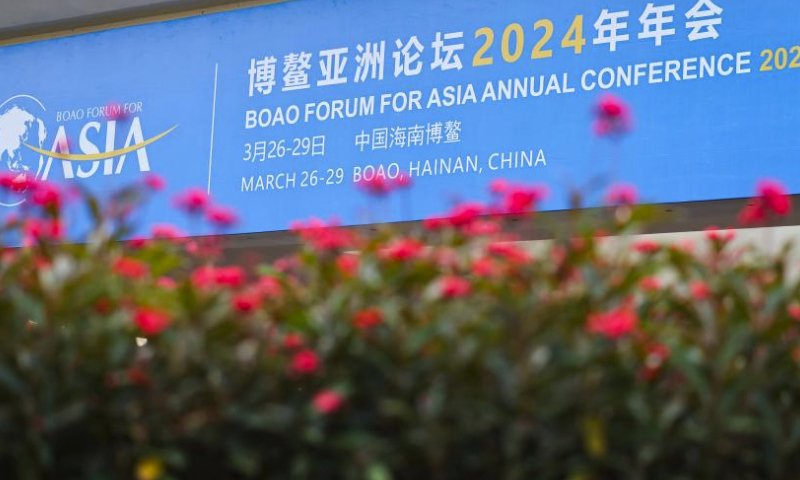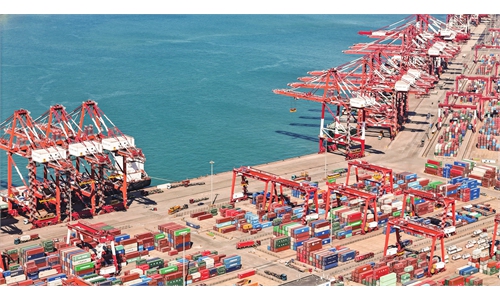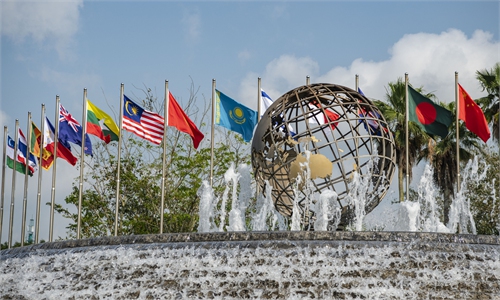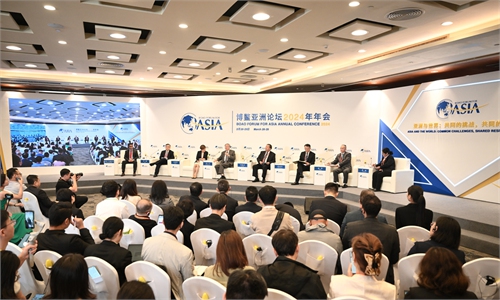
This photo taken on March 22, 2024 shows a view of the Boao Forum for Asia (BFA) International Conference Center in Boao, south China's Hainan Province. The Boao Forum for Asia (BFA) Annual Conference 2024 will be held from March 26 to 29 in Boao, focusing on how the international community can work together to deal with common challenges and shoulder their responsibilities. (Xinhua/Yang Guanyu)
Senior trade officials and experts on Tuesday stressed the significance of further enhancing WTO's role in promoting global trade amid the current fragmentation, while the "decoupling" practices implemented by the US and some Western countries will affect other economies.
The comments were made at the ongoing Boao Forum for Asia (BFA) Annual Conference 2024.
The US and Western countries created the WTO as the center of the global trade system and established a set of international rules, and the trade system and international rules have played a significant role in boosting the global trade system and economic prosperity in the past few decades. It's a pity that they have destroyed it, Long Yongtu, former vice minister of China's Foreign Economic Relations and Trade, said at the subforum.
Long noted that the root of the trade fragmentation lies in the fragmentation of international multilateralism and the marginalization of the WTO, stressing the urgency of strengthening the WTO's functions and carrying out necessary reforms.
Former US secretary of commerce Carlos Gutierrez said at the subforum that the US has a lot of responsibility for the deglobalization trend, as the country has adopted political nationalism. Gutierrez said that both parties have been very afraid politically of embracing globalization… and the US can't have these individual nationalistic policies that go against globalization.
The most important reason for global trade fragmentation is the fact that some countries have been dealing with domestic problems, such as higher unemployment, slower economic growth and a declining share of the middle class, and these countries often use international trade as a scapegoat while thinking that these problems are caused by imports, Justin Yifu Lin, dean of the Institute of New Structural Economics at Peking University, said at the subforum.
Lin said that globalization is in the best interests of developing countries, which should unite and continue to promote the international trade system under the rules of the WTO.
Amid calls by the US and some Western countries for decoupling from China, officials and experts noted that such practices will only hurt the West while damaging the global supply chain.
Michele Geraci, former undersecretary of state at the Italian Ministry of Economic Development, told reporters on the sidelines of the subforum that "decoupling" would be damaging for both China and Europe, but worse for Europe than for China.
The US and Western countries, aiming to exclude China from their supply chains with targeted measures, have seriously affected global industrial and supply chains, resulting in the countercurrent of economic globalization while further lowering the efficiency of global investment and trade, Sang Baichuan, dean of the Institute of International Economy at the University of International Business and Economics, who is attending this year's BFA Conference, told the Global Times on Tuesday.
Trade protectionist practices implemented by the West targeting China are not only detrimental to China but also for the Western countries themselves, Sang said, adding that these practices increase import costs and lower investment efficiency, leading to a decrease in earnings for local enterprises.



